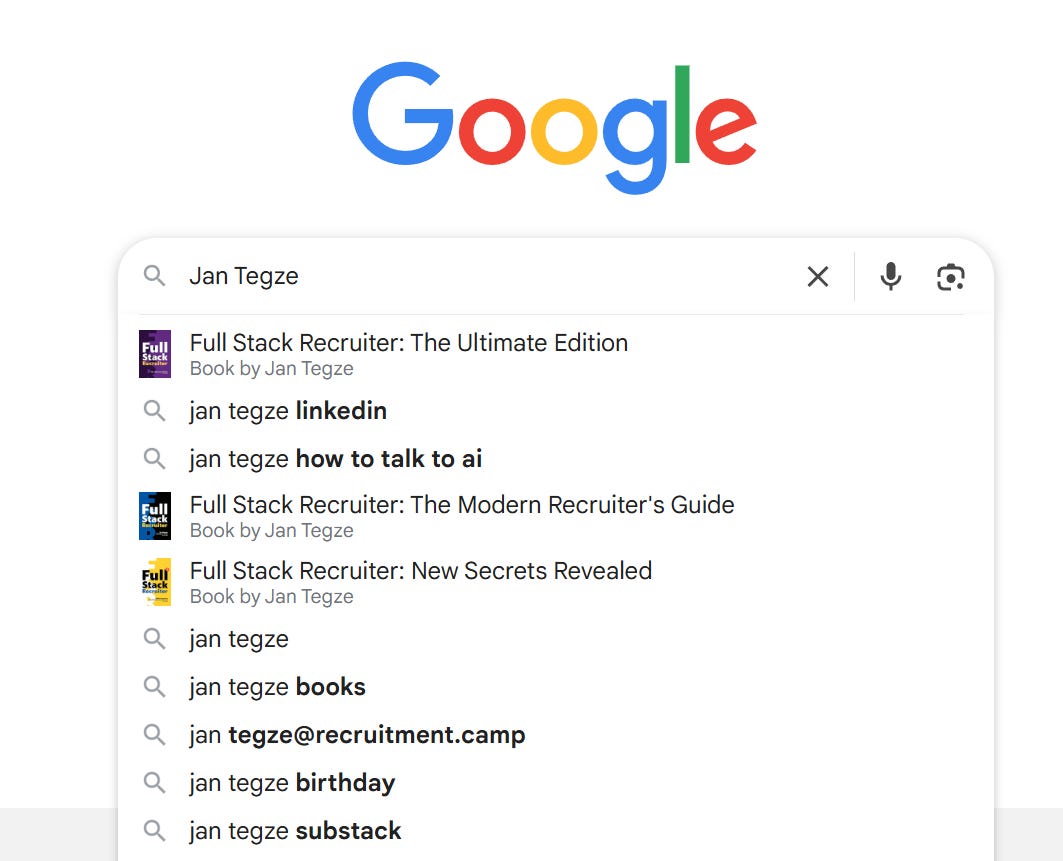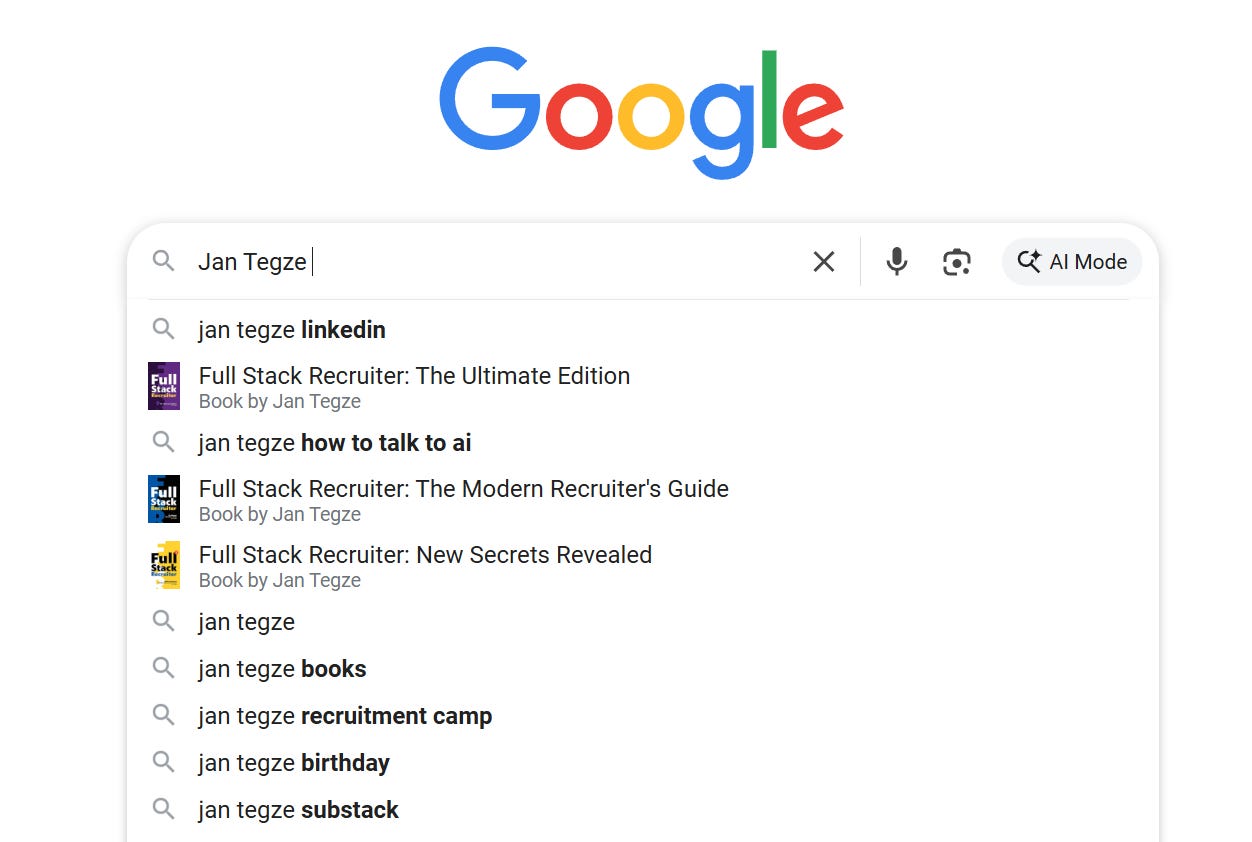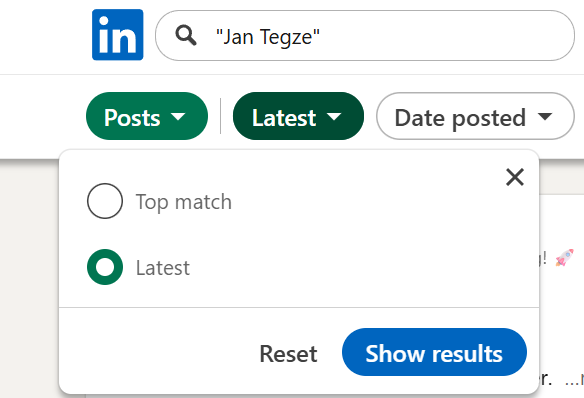Why Recruiters Should Google Their Name
Recruiters should Google their name to track mentions, monitor LinkedIn visibility, and use AI tools to protect their online reputation and professional brand.
Have you ever Googled your own name? If not, you probably should. For recruiters, a name is more than just an ID card. It is tied to trust, credibility, and how candidates see you before they even say hello, especially if you are working as a freelancer.
Recruiters often get dragged into posts, sometimes praised, sometimes blamed, and sometimes just mentioned without context. A frustrated candidate might write about an experience, add your name, and suddenly your name is out there for hundreds or thousands of people to see.
If they don’t tag you or someone doesn’t tell you about the post, you might never find out about it, and you won’t have the chance to defend yourself.
This is why Googling your name from time to time is not vanity. It is reputation management. It helps you spot what is being said, catch problems early, and understand how you show up online.
How Recruiters Can Search Their Name on Google Effectively
Typing your name into Google without any filters often shows too many results, many of them unrelated. If you have a common name, it gets even messier. That is where Boolean search operators come in. They help narrow down results so you only see what really matters.
Here is how to do it:
Use quotation marks around your full name:
"First Name Last Name". This tells Google to show only exact matches, not scattered mentions of your first and last name separately.Add keywords to refine the search. For example:
"First Name Last Name" recruiteror"First Name Last Name" hiring jobs. This works well if you want to see mentions related to your professional life.Try adding your company name:
"First Name Last Name" CompanyName. That helps you track if people are talking about you in connection with your current role.Exclude results that are not relevant with the minus sign. For example,
"First Name Last Name" -footballif you share a name with a football player.
The point is to make Google work for you. Instead of digging through pages of irrelevant links, you can quickly spot if your name appears in a job forum, a blog, or even a candidate’s review.
Recruiters who check this regularly stay one step ahead. You see the same results your candidates might see, and you can address anything that could affect your reputation before it spreads.
Top Interview Techniques Recruiters Must Know
An interview can make or break a hiring decision. But not every interview style gives you the same results. Some recruiters treat interviews like casual conversations, others rely on gut feeling, and some jump straight into technical grilling. The problem is, without a clear approach, interviews become inconsistent, unfair, and harder to evaluate.
It will also give you a better understanding of what people are searching for the most, helping you identify trends, preferences, and the topics or products that are capturing the most attention.
Keep in mind that every country is different, and search trends can vary greatly depending on the location. To get a better understanding of what people in a specific country are searching for, you can use a VPN to change your virtual location.
This allows you to see localized search results and gain insights into trends, preferences, or popular topics in that region. It's a helpful tool for research, especially if you're trying to tailor content or strategies to a particular audience.
How Recruiters Can Use Google Alerts to Monitor Their Name
If you only type your name into Google once in a while, you might miss something important. Mentions can appear in a candidate’s post, a forum thread, or even a news site. By the time you stumble across it, the damage might already be done. That is why setting up Google Alerts is one of the smartest habits you can build.
Here is how it works. Google Alerts is a free tool that emails you whenever your name appears online. You set it up once, and then it does the work for you. Instead of searching every week, you get notified automatically.
To set it up:
Go to google.com/alerts.
Type your name inside quotation marks, like
"First Name Last Name".Add extra keywords if needed, such as recruiter, hiring, or your company name.
Choose how often you want to be alerted, for example, once a day or once a week.
Enter your email address and confirm.
From that point on, you will know when your name shows up in articles, blogs, or public posts. It is simple, and it gives you peace of mind.
For recruiters, this is more than convenience. It is a way to protect your professional reputation before others form opinions about you. Candidates, hiring managers, or colleagues might Google you, so being aware of what they see keeps you in control.
Why Recruiters Should Track LinkedIn Mentions of Their Name
Google is useful, but it does not always show what happens inside LinkedIn. And for recruiters, LinkedIn is often where your name gets mentioned the most. A candidate might tag you in a post about their job search, someone might recommend you, or you could be part of a bigger discussion you never saw.
The good news is you can check this yourself:
Go to the LinkedIn search bar.
Type your name inside quotation marks, like
"First Name Last Name".Switch to the “Posts” filter and select “Latest”
This way, you can see if anyone has tagged or mentioned you directly in their content. If your surname is rare, it will be easier. But even with a common surname, it is still worth checking.
Why does this matter? Because candidates often Google you and then look you up on LinkedIn. If the first thing they see is a negative post about you, that can influence how they feel before your first message or call. On the other hand, if they see positive mentions, you can build on that reputation.
Checking your LinkedIn mentions is like eavesdropping on the conversations happening about you in the professional world. You do not need to respond to everything, but knowing what is out there keeps you in control.
How Recruiters Can Use AI Tools to Monitor Their Online Reputation
Googling your name and checking LinkedIn works, but it can get time consuming. That is where AI tools make a difference. They can track mentions of your name across the web and even tell you if those mentions are positive or negative.
Here are a few simple ways to use AI for this:
AI monitoring platforms: Some tools scan blogs, forums, and social media. They highlight when your name shows up and flag the overall sentiment. This can help you understand if a post is critical, neutral, or supportive without digging too deep.
Custom tracking with keywords: AI tools let you monitor not just your name, but combinations like “First Name Last Name recruiter” or “First Name Last Name hiring.” This keeps the alerts relevant to your work instead of unrelated results.
The real benefit here is speed. Instead of chasing down mentions, AI gives you a dashboard or daily summary. You spend a few minutes checking it, and you always know where your name appears. You can also automate many things via n8n.
For recruiters, this is like having a personal assistant that taps you on the shoulder and says, “Here’s what people are saying about you today.”
AI Prompt to Audit Your Online Reputation
You can use AI tools to conduct an audit and discover what information AI can uncover about you!
Disclaimer: All provided prompts are for informational purposes only. The creators of this guide are not responsible for how users utilize this information. Users are solely responsible for ensuring their actions comply with all applicable laws and ethical standards. Consult with legal counsel if you have any questions about the legality of your research.
Instructions
Replace placeholders: Substitute [Full Name] with the individual's complete name. If known, replace [Location, if known] with their city, state, or country. If the location is unknown, leave that part of the prompt as is.
Choose your AI: Paste the prompt into your preferred AI language model (e.g., ChatGPT, Bard, Perplexity, Claude, etc.). Try out different AI tools to learn even more!
Refine and iterate: The AI may provide a large amount of information. Review the results carefully. If necessary, refine your prompt by adding more specific keywords (e.g., "previous employer: Acme Corp") or narrowing the location. Always verify information from multiple sources.
Ethical considerations: Use this prompt responsibly and ethically. Only access and use publicly available information. Respect privacy laws and guidelines. This prompt is intended for legitimate research purposes, such as due diligence, journalism, or academic study. Never use this information for malicious purposes, harassment, or stalking.
Verify all information: Make sure that all information you get is up to date and coming from a verifiable source.
Shorter Version
Compile a comprehensive public profile for [Full Name], potentially linked to [Location, if known]. Locate all verifiable online information, including social media profiles, including but not limited to platforms such as LinkedIn, Instagram, Facebook, Twitter/X, TikTok, and any other relevant social networks, professional history (past/present employment, ventures), and any news media mentions. Search public records databases (where legally/ethically appropriate). Include any other relevant online content (blogs, interviews, videos, publications). Prioritize recent activities, current professional roles, notable achievements, and any public controversies. Provide direct source links for all informationLonger Version
Conduct a thorough online investigation to gather all publicly accessible data pertaining to [Full Name], potentially residing in or associated with [Location, if known]. This search should encompass a comprehensive range of online sources. Specifically, identify and provide links to any existing social media presence, including but not limited to platforms such as LinkedIn, Instagram, Facebook, Twitter/X, TikTok, and any other relevant social networks. Further, compile a detailed account of their professional background, encompassing past and present employment, business ventures, and professional affiliations. Extend the search to include mentions in online news publications, press releases, or media outlets. Explore publicly available records databases, where legally and ethically permissible, looking for relevant entries. Finally, identify and link to any other pertinent online content, such as personal or professional websites, blog posts authored or featuring the individual, podcast or video appearances (including interviews), and published articles. Prioritize information pertaining to recent activities, current professional endeavors, significant accomplishments, and any publicly documented controversies or legal matters. Ensure all provided information is accompanied by direct links to the original source material.There are plenty of other prompts you can try, including some more advanced ones that I’m sharing with supporters of this newsletter in their section.
How Recruiters Can Protect Their Reputation Online
Your name is your reputation, and in recruiting, reputation is everything. Candidates, clients, and hiring managers will often Google you before they decide how seriously to take you. If you do not know what they see, you are walking into conversations blind.
The fix is simple. Set up Google Alerts so you never miss a mention. Use Boolean searches to filter out the noise. Check LinkedIn posts to see how you show up in professional conversations. And let AI tools do the heavy lifting so you can spend your time recruiting instead of searching.
Think of it as checking your digital mirror. A quick look once a week or even once a month can save you from bigger problems down the road. Protect your reputation now, so it can keep protecting you later.
AI Prompt to Help You Understand Anyone in Depth
Getting to know someone goes far beyond a résumé or LinkedIn headline. If you want to really understand a person, whether it is a candidate, a colleague, or a leader you will be working with, you need to look deeper. What drives them? How do they make decisions? What experiences shaped them into who they are today?
That is exactly what this framework is designed for:







